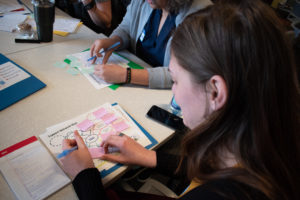 It can be challenging to envision yourself succeeding in a career when you can’t relate to others in that field. Sometimes connecting with another person with whom you identify can make the difference between continuing course or changing direction.
It can be challenging to envision yourself succeeding in a career when you can’t relate to others in that field. Sometimes connecting with another person with whom you identify can make the difference between continuing course or changing direction.
Many women in STEM fields have encountered this dearth of relatable role models. A program cofounded by CSU atmospheric science professor Emily Fischer endeavors to foster these important connections and bolster gender diversity in STEM.
PROGRESS, or PROmoting Geoscience Research, Education and Success, has demonstrated that mentorship is key to the retention of underrepresented groups in the geosciences.
“PROGRESS enhances the mentoring support of undergraduate women, and this strengthens their scientific identify, and this increases their interest in the earth sciences,” said Fischer, who is principal investigator for the National Science Foundation-funded project.
PROGRESS provides undergraduate women access to female role models in scientific fields, beginning with a workshop where panels of professional women in the earth sciences discuss their experiences. The undergraduates also are encouraged to attend networking events and engage with peers and mentors through a website and Facebook group. The program has been implemented across nine universities and two U.S. regions, the Colorado/Wyoming Front Range and North and South Carolina.
The results are promising. PROGRESS participants are three times more likely to have a mentor than their peers, and even Fischer was surprised by just how much of a difference having a role model makes.
“The odds of a female undergraduate student persisting within an earth science major approximately doubles for each female role model they identify,” she said.
Access to multiple female role models increased the retention rate of PROGRESS participants compared to a propensity-score matched control group. These results were published in Geosphere last year, a paper that Science Magazine selected as Editors’ Choice in December 2018.
Anecdotal evidence affirms the program’s success. 2015 PROGRESS mentee Sarah Whipple said she was empowered by the experience of being around female mentors and other female scientists.
“It showed me that there is a strong community of women in STEM at CSU and across the Front Range.”
Whipple was inspired and motivated to continue her studies by female mentors both within and outside the program. She is now an ecology graduate student at CSU. She’s also helping to inspire the next group of undergraduate women in STEM as a PROGRESS mentor.
“I love helping other students, especially other female STEM majors, because I have had such influential mentors myself. I like to give back with my support if possible.”
Though this NSF project is coming to an end, Fischer wants to learn if specific parts of PROGRESS are leading to its success, in case the program could be streamlined to offer it to more students. She also hopes to scale it up to include more regions, more diverse types of higher-education institutions, and broadened participation of women from underrepresented groups.
“Given the strong evidence for the effectiveness of PROGRESS in supporting and retaining first- and second-year college women in STEM, we aim to extend this research,” Fischer said.
Fischer has submitted a new grant request to the NSF, in which she proposes to target the program’s essential elements and expand its application.